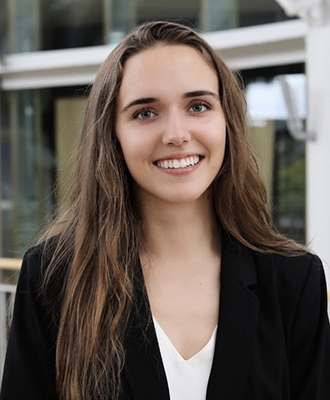Case Study: Emily

Last summer, I was a member of the Center for Neurotechnology (CNT) Young Scholars Program (YSP). The program offers research experience in neural engineering as well as education in scientific skills. Topics such as neural ethics and scientific communication are also covered.
Before my internship, I had never really done research, and this program allowed me to learn more about what is involved. I am now a college freshman at the University of Oregon, majoring in human physiology with a career goal aimed at pediatric neuromuscular rehabilitation research and/or medicine. I learned how to be more resourceful and self-motivated, as well as to work in a team and bounce ideas off of one another. I also have a physical disability that makes it difficult to walk long distances or write for extended time periods, so I used a mobility scooter to go between class and lab, a smart pen to take notes, and a supportive desk chair. My lab was always very accommodating and willing to talk about solutions if I had problems.
I worked in Dr. Chet Moritz’s lab at the University of Washington Medical Center along with two other high school students and two undergraduate students. Every Tuesday morning, all of the summer interns had a weekly communication class lead by Dr. Lise Johnson. The classes focused on the skills needed to be successful in a scientific field. I found the classes to be very valuable because even though I wrote lap reports in my high school science classes, I was never shown how those skills would translate into a real-world application. All of the work in this class was geared towards preparing for the research talk I would have to present at the end of the program.
We also attended study sessions led by our coordinator, Nona Clifton, where all of the high school students could meet, talk about what we learned, and clear up any questions that we had for class that morning. I was thankful for the support I was given in the study session. Working with Nona and my fellow YSP’s helped me keep up with the rigor of the classes and my research work within in the lab.
On Thursday mornings, we attended seminars on a variety of topics in the field of neural engineering such as industry, neuroethics, human and animal research, and impostor syndrome. On top of these seminars, the CNT held a number of round table discussions, the highlight of which was the end-user round table. I was able to meet users of neural technology and learn how technology impacted their lives. From these discussions I could see how important the field of research is, as I was exposed to how much potential neural engineering holds in improving the lives of people with disabilities.
Prior to this summer I had minimal experience with neural engineering and engineering in general, which caused me to have a very steep learning curve. Luckily, my mentor, Ivana, was very supportive and urged me to learn AutoCAD. After watching YouTube tutorials for a week, I learned how to use AutoCAD and made two products that I am now very proud of.
My advice to other students with disabilities would be to apply for internships that interest them even f they’re worried that their disabilities might create some obstacles. Things can almost always be done to make opportunities accessible; don’t let your disability hold you back from what you actually want to do—just make sure you request accommodations early!
My advice to other engineering research centers and faculty in general is to listen to the needs of people with disabilities and try to be accommodating. Follow ADA guidelines and try to be proactive and welcoming where possible. Let all students know how to arrange accommodations and be willing to help when possible. The thing that especially made me feel most welcomed during my internship was that no one ever singled me out for having a disability—I never felt different or like things had to be changed specifically for me. While it is important to recognize that some people have disabilities and with those disabilities come needs, it is extremely important to remember that disabled people are people first.
I am very happy to have had such an amazing experience at the CNT this summer, and I look forward to using all that I have learned in the future.